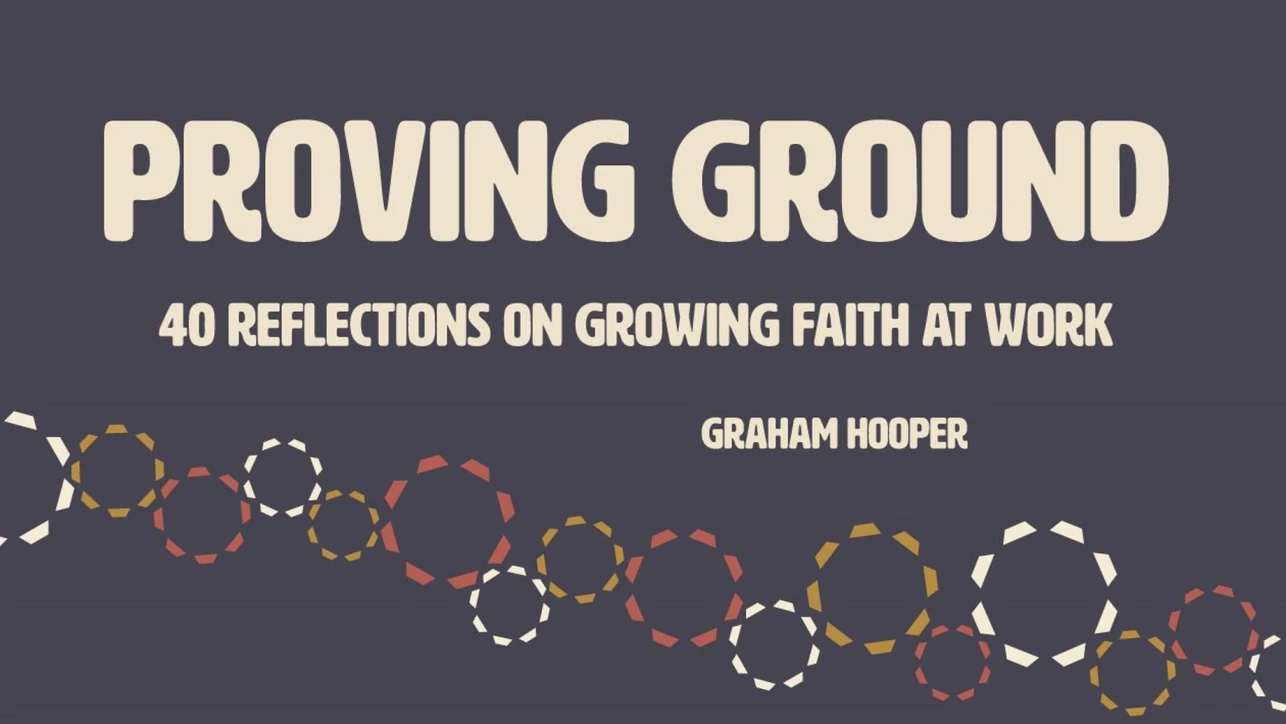Proving Ground
There is no such thing as untested Christian faith.

There is no such thing as untested Christian faith.
Testing is part of Christian experience. Not in the sense that God sets us tests we have to pass to qualify to be Christian. If he did, none of us would make the grade! But our Christian faith is tested and ‘proved’ in life generally when we face sickness, bereavement, and family problems, or when we experience doubt, depression or injustice. We naturally start wondering, ‘Is God really there? Does he care about my life? Why do I have to wait so long for God to answer my prayers?’
As we spend most of our waking hours working, whether at home, in voluntary work, study or in a paid job, it follows that our faith will be tested in our work. It’s there we have to deal with long hours, stress and difficult people. At work we face tests of our honesty. We may make mistakes, fail, and get our priorities wrong. Will we remember to thank God in the good times? Will we trust God when the going gets tough? Will we compromise our values when it suits us? Do we love people as Jesus commanded us, or use them as stepping stones to our own success? Will our faith prove to be true and lasting, or just religious talk?
But isn’t ‘testing’ a negative thing? Aren’t testing experiences often difficult, unpleasant or even traumatic? I never enjoyed exams at school. I don’t enjoy having blood tests, X–rays or more invasive medical tests. I certainly wouldn’t like to have to re–take my driving test! Isn’t God’s ‘testing’ an experience we would rather avoid if we want to enjoy life? So, if we are trying to live out Christian faith at work, why not just concentrate on opportunities to use our gifts and talents. Why not emphasise the more attractive aspects like creativity, rewards, and fulfilment? Wouldn’t this be a much more positive approach?
But the reality is that every Christian experiences God’s ‘testing’ in one way or another. According to the Bible, it’s part of the lifelong process of being changed by the Spirit of God to become more like Jesus, (1 Thessalonians 4;3; 2 Corinthians 3:18). God’s purpose is to produce ‘gold’ in terms of Christ–like character from the unpromising raw material of our lives.
In the Bible we find that testing has always been part of the experience of God’s people. In our English Bibles, depending on the translation, the most commonly used verbs are: ‘prove’, ‘try’, ‘examine’, ‘probe’, ‘test’, ‘tempt’, ‘refine’. Testing in the Bible seems to come in three ways:
· Probing and revealing The Israelites’ commitment to their God was tested like this as they wandered through the desert before they entered the Promised Land:
This form of ‘testing’ by God is a reminder that he sees into the hearts of everyone, good and bad, believers and non–believers. He wants to show us the true state of our lives, so that we know ourselves, and more importantly, learn more about our righteous, holy, loving, faithful God in the process.
· Testing and refining This sort of testing is more than God’s gentle probing. It’s ratcheted up a notch. This is about God building our faith in him, and changing us for good, through stressful and adverse circumstances.
The Israelites were tested like this as they wandered through the desert before they entered the Promised Land. The New Testament continues the Old Testament theme of God’s people being tested through hard experiences.
· Temptation This form of testing is one we all experience in one form or another, every day. The words ‘temptation’ and ‘testing’ are sometimes used interchangeably in our English Bibles. But this is not God’s testing. Temptation comes from Satan, described by Jesus as ‘the evil one’.
Whether it’s God’s probing and revealing, refining, or temptation to sin, all of us experience these three forms of testing. How do we experience this testing in our work and how do we deal with it?
For me, and I suspect for all Christians, this is a continuing learning experience.
So God’s testing is not a ‘negative’. It is an essential part of God’s work in our lives. It’s more like the very necessary road testing of a new vehicle on a ‘proving ground’. How does it perform under actual driving conditions and in all weathers? Will it hold together? Will it last, or will it fall apart? Our work, like every part of our life, is a ‘proving ground’ for our faith, a place where we learn more about God, and more about ourselves.
So God’s testing is not a ‘negative’. It is an essential part of God’s work in our lives. It’s more like the very necessary road testing of a new vehicle on a ‘proving ground’. How does it perform under actual driving conditions and in all weathers? Will it hold together? Will it last, or will it fall apart? Our work, like every part of our life, is a ‘proving ground’ for our faith, a place where we learn more about God, and more about ourselves.
But this ‘proving’ works both ways. As we learn to trust God, we prove for ourselves that God is faithful and that his Word is true, even when the cards all seem stacked against us. In the words of Psalm 34 we ‘taste and see that that the LORD is good’. More than that, with God’s help, we start to show by the way we work, how we treat people and how we deal with difficulties, that God is real and that he is at work in his world for good.
This applies to every Christian. The gospel is good news for all of us, and it speaks to every part of our life.
